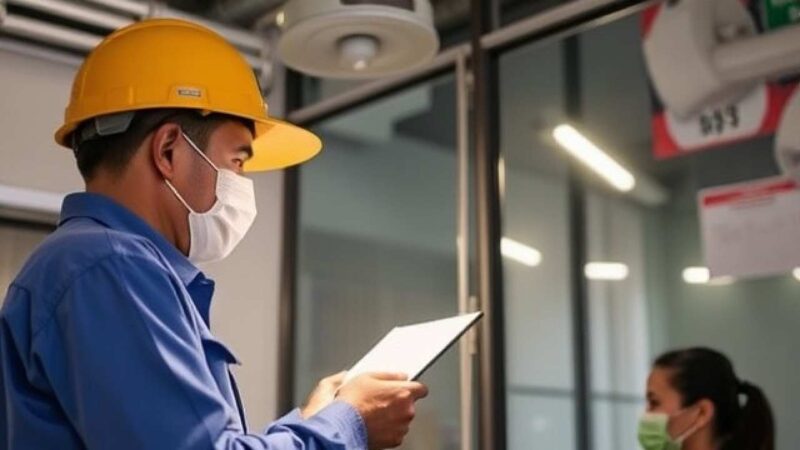It’s intriguing how language and industry-specific jargon vary across regions, including in a diverse city like Miami. The term “Como Decir Inspeccion De Cabillas En Ingles Miami” translates into “rebar inspection” in English, reflecting the vital role of construction safety. Miami’s construction landscape necessitates understanding both Spanish and English terminologies due to its multicultural workforce.
The significance of rebar inspection in Miami is underscored by its booming construction industry, where rigorous safety standards are paramount. Historically, Miami has seen rapid urban development, leading to a high demand for skilled inspectors familiar with both Spanish and English. In 2022, Miami recorded a substantial increase in bilingual engineering professionals, highlighting the importance of cross-linguistic expertise in maintaining structural integrity.
The term “inspección de cabillas” translates to “rebar inspection” in English, a crucial component of Miami’s construction industry, where bilingual proficiency facilitates effective communication and compliance with safety standards amid the region’s diverse workforce and regulatory environment.
Translating “Inspección de Cabillas” to English
The phrase “Como Decir Inspeccion De Cabillas En Ingles Miami” translates directly to “rebar inspection” in English. Rebars, or reinforcing bars, are crucial in construction as they strengthen concrete. They ensure buildings are durable and safe. In Miami, understanding this term is important, given the city’s construction boom. Bilingual communication is vital to bridge language gaps in the industry.
Rebar inspections are essential for construction safety. Inspectors check if the rebar is placed correctly and securely. This ensures the structural integrity of buildings. In Miami, projects often involve diverse teams speaking multiple languages. Translating technical terms accurately helps avoid miscommunication.
One might wonder why accurate translation is necessary. Misunderstandings could lead to significant errors. Construction standards are strict, aiming to protect both workers and the public. Ensuring everyone understands the requirements is vital for safety. Hence, clarity in communication is needed, especially in multilingual settings.
To summarize the importance, let’s look at a simple table to explain common uses of rebar.
| Use | Purpose |
|---|---|
| Residential Buildings | Supports walls and floors |
| Bridges | Enhances stability |
| High-rise Buildings | Provides vertical reinforcement |
The English Equivalent to “Inspección de Cabillas”
The English term for “Como Decir Inspeccion De Cabillas En Ingles Miami” is “rebar inspection.” This translation is essential for construction professionals who need precise communication. Rebars are steel bars used to reinforce concrete, making structures more robust. Accurate inspection ensures that these bars are in the right place. It’s crucial in places like Miami, where construction is booming.
Understanding this term helps maintain construction quality and safety. Rebar inspection involves several steps to ensure everything is done correctly. Inspectors check the size, spacing, and positioning of the rebars. They also verify that the steel is free of rust or damage. This process prevents structural problems later on.
In Miami, with its mix of cultures, bilingual skills are a big plus in the construction field. Teams often include workers who speak different languages. Being able to switch between Spanish and English helps projects run smoothly. It avoids costly mistakes and delays. Here’s a quick list highlighting key benefits of accurate translation:
- Prevents miscommunication.
- Boosts project efficiency.
- Enhances safety.
Rebar inspection is not just about checking steel bars; it ties into overall building safety and durability. Construction standards demand attention to detail at every stage. Misinterpreting terms can lead to practices that fall short of these standards. Collaborating effectively in a bilingual environment is key. This ensures that every building in Miami meets the highest safety criteria.
The Importance of Rebar Inspection in Miami’s Construction Scene
In Miami, construction is ever-present, fueled by constant growth and development. A key factor ensuring the safety and longevity of buildings is rebar inspection. This process involves scrutinizing the reinforcement bars, or rebars, used in concrete. Proper inspection checks that they meet the necessary standards. Otherwise, the integrity of a structure might be compromised.
The city’s unique weather patterns make rebar inspection even more crucial. Miami faces heavy storms and occasional hurricanes. Buildings need to withstand these extreme conditions. Rebar plays a vital role in absorbing stress and resisting cracks during such events. Thus, thorough checks help in maintaining safety.
Rebar inspection involves checking several aspects of a construction project. Inspectors assess the quality and placement of the steel bars. Any defects in the rebar can lead to structural weakness. Proper inspection ensures these issues are identified early. This prevents costly repairs and maintains structural integrity.
Let’s look at a table that highlights the significance of rebar inspection:
| Aspect | Impact |
|---|---|
| Correct Placement | Ensures Load-Bearing Strength |
| Quality Assurance | Reduces Repair Costs |
| Compliance With Codes | Maintains Building Safety Standards |
Bilingual Requirement in Miami’s Engineering Inspections
In Miami, a multicultural city, bilingual skills are essential for engineering inspections. Many construction teams feature diverse linguistic backgrounds, primarily Spanish and English. To ensure safety and compliance, inspectors must communicate effectively in both languages. This ability reduces misunderstandings during critical assessments. It enhances teamwork among professionals from different cultural backgrounds.
Bilingual inspectors can navigate conversations smoothly, ensuring everyone understands project details. This is crucial when discussing technical aspects and safety protocols. Miscommunication can lead to errors or costly delays. Fluent bilingual communication helps maintain project timelines and safety standards. It creates a more cohesive work environment.
Let’s explore how bilingual abilities enhance inspections through the following list:
- Facilitates Clear Communication
- Prevents Costly Mistakes
- Improves Team Collaboration
- Boosts Client Confidence
Another benefit of having bilingual inspectors is improving professional relationships. Clients and contractors often feel more comfortable knowing they can converse in their preferred language. This builds trust and ensures clarity in project requirements. Moreover, it reflects positively on the company’s reputation. Being bilingual is an asset in Miami’s dynamic construction sector.
The growing demand for bilingual skills has influenced hiring practices in engineering firms. Candidates with these abilities often have better career prospects. Many companies prioritize them when selecting new hires. Add this advantage to the technical expertise needed in inspections. Such practices align well with Miami’s diverse demographic.
Building Safety: The Pivot of Construction Solution
Safety is the backbone of any construction project, critical to protecting lives and investments. Ensuring this requires strict adherence to safety regulations and guidelines. Regular inspections check that building codes are followed. These practices prevent accidents and ensure long-term durability. In Miami, this is especially important due to changing weather conditions.
One key component of building safety is the use of high-quality materials. Rebar, concrete, and steel all play crucial roles in construction stability. Inspectors verify the integrity and quality of these materials. They ensure structures can withstand environmental forces. Proper material checks are essential in preventing future problems.
Safety measures also extend to construction sites, where guidelines help protect workers. They include wearing protective gear and following specific protocols. Safety training ensures workers know how to handle equipment and tools correctly. Compliance with site safety rules reduces the chance of accidents. Here are some critical safety practices:
- Use of Protective Gear
- Regular Safety Training
- Equipment Maintenance
- Emergency Preparedness
The implementation of safety technology is also shaping the construction industry. Innovations like drones and wearables enhance site monitoring. They help track safety compliance and spot potential hazards in real-time. Companies using these technologies often report fewer incidents. Cutting-edge tools make construction safer and more efficient.
Safety is not just a checklist item; it’s the heart of the construction process. It impacts every project stage, from planning to completion. Focusing on it leads to creative, secure, and successful building solutions. It safeguards both current workers and future inhabitants. In a city like Miami, safety truly pivots construction.
English-Spanish Language Fluidity in Miami’s Construction Market
Miami’s construction market thrives on its bilingual environment, with English and Spanish being equally important. Most construction workers and professionals are fluent in both languages, which ensures clear communication. This fluidity helps teams understand project details accurately. Miscommunication is minimized, reducing errors on site.
Having a workforce that speaks both languages also boosts productivity. Teams can discuss designs, plans, and safety measures without language barriers. This encourages collaboration and teamwork among diverse crew members. Leaders often switch between languages during meetings, depending on the audience. This flexibility is crucial in a multicultural city like Miami.
The ability to communicate in both languages can impact project outcomes significantly. It allows for seamless interactions not only within teams but also with clients and suppliers. Delivering project updates and addressing concerns in a language clients understand builds trust. It ensures everyone is on the same page, leading to better project execution. Here’s a table outlining language fluency benefits:
| Aspect | Benefit |
|---|---|
| Communication | Reduces Misunderstandings |
| Productivity | Enhances Collaboration |
| Client Relations | Builds Trust and Clarity |
Language skills also open up more job opportunities in Miami’s construction market. Companies seek bilingual candidates to meet the city’s diverse needs. Employees who can effortlessly navigate both worlds offer valuable skill sets to employers. This demand for bilingual workers continually grows as Miami develops further. Professionals fluent in English and Spanish often find rewarding careers.
Having English-Spanish fluidity is not just an advantage; it’s a necessity in Miami’s construction sector. It allows for more efficient work environments and better customer service. As the city continues to grow, such skills will remain vital. This dual-language proficiency contributes significantly to Miami’s construction success. Fluent communication is a key part of sustaining this vibrant market.
Conclusion
The fusion of English and Spanish in Miami’s construction sector underscores the city’s dynamic and multicultural essence. Effective communication between diverse teams relies heavily on bilingual skills, ensuring accurate project execution and safety compliance. As Miami continues to grow, this linguistic proficiency remains an indispensable asset.
The “Como Decir Inspeccion De Cabillas En Ingles Miami“, a job defined by precision and safety, benefits greatly from clear language understanding. With the city’s unique climate challenges, maintaining these standards is crucial. Embracing bilingualism not only enhances project success but also strengthens professional relationships within the industry, reflecting a commitment to both innovation and cultural respect.
FAQ:
The English translation of “Inspección de Cabillas” is “Rebar Inspection.”
Rebar inspection ensures structural integrity and safety in Miami’s construction projects, particularly due to the city’s extreme weather conditions.
Bilingual skills enhance communication, productivity, and client relations, reducing misunderstandings and errors, and building trust.
Language fluidity ensures clear communication, seamless interactions, and better project execution, ultimately contributing to project success.
Como Decir Inspeccion De Cabillas En Ingles Miami guarantees compliance with safety regulations, prevents accidents, and ensures long-term durability, safeguarding lives and investments.









